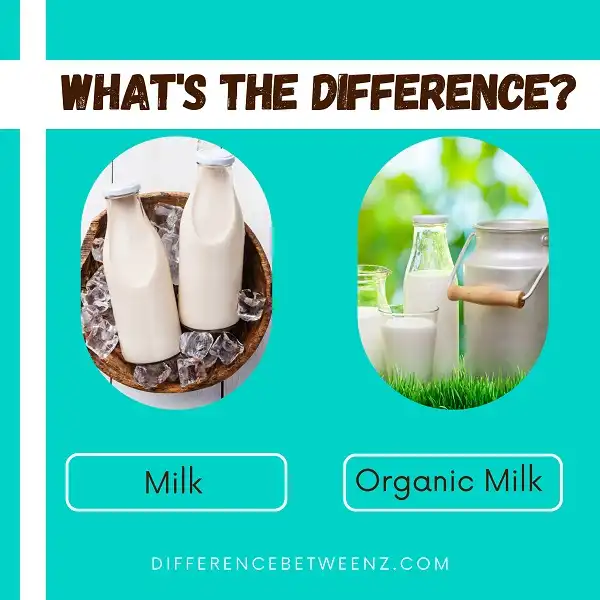Organic milk is a great choice for people looking for a healthy drink option. But what exactly makes organic milk different from regular milk? Let’s take a closer look at the difference between organic and regular milk.
What is Milk?
Milk is a fluid secreted by the mammary glands of mammals. It is composed of water, fat, protein, and lactose. Cow’s milk is the most popular type of milk consumed by humans, though goat’s milk, sheep’s milk, and camel’s milk are also consumed in some parts of the world. Milk has been a staple food for humans since ancient times and continues to be an important source of nutrition today. Milk is a good source of calcium, phosphorus, and other minerals, as well as protein and fat. It also contains vitamins A, B2, B12, and D.
While milk has many nutritional benefits, it also contains cholesterol and saturated fat. For this reason, some people choose to avoid milk or consume it in moderation. Milk can also cause allergies in some people. If you are allergic to milk, you should avoid all dairy products.
What is Organic Milk?
- Organic milk is a type of milk that is produced without the use of artificial hormones or pesticides. Farmers who produce organic milk must follow strict guidelines set by the US Department of Agriculture (USDA). These guidelines cover everything from the way cows are raised and fed to the way their milk is processed. As a result, organic milk is often seen as a more natural and wholesome option.
- Organic milk is also usually higher in certain nutrients than conventional milk. For example, it typically contains more omega-3 fatty acids, which are beneficial for heart health. Additionally, organic milk may contain higher levels of conjugated linoleic acid (CLA), a type of fat that has been linked to various health benefits. However, it is important to note that there is currently no definitive evidence that organic milk is any healthier than conventional milk.
- Overall, organic milk is a type of milk that is produced without the use of artificial hormones or pesticides. It is often seen as a more natural and wholesome option due to its production methods. Additionally, organic milk may be higher in certain nutrients than conventional milk. However, there is currently no definitive evidence that organic milk is any healthier than conventional milk.
Difference between Milk and Organic Milk
- Organic milk is milk from cows that are raised in accordance with the standards set forth by the United States Department of Agriculture (USDA).
- This means that the cows must have access to the outdoors, be fed organic feed, and cannot be given growth hormones or antibiotics.
- Organic milk must come from cows that are part of a herd managed under an approved organic plan.
- The term “organic” on a food product means that it was produced according to federal guidelines addressing, among other things, soil and water quality, pest and weed control, and animal raising practices.
So, while all milk comes from cows, not all milk is organic. - Organic milk is subject to more stringent regulations than non-organic milk. The main difference between organic and non-organic milk is the way the cows are raised. Cows that produce organic milk must have access to the outdoors and must be fed organic feed.
They also cannot be given growth hormones or antibiotics. As a result of these different production practices, organic milk typically costs more than non-organic milk.
Conclusion
The difference between organic milk and regular milk is the way the cows are treated. Organic cows are not given growth hormones or antibiotics, and they are allowed to roam free on pasture. This results in creamier, richer milk that is higher in nutrients than conventional milk. If you’re looking for the best possible quality dairy product, organic milk is your best option.


